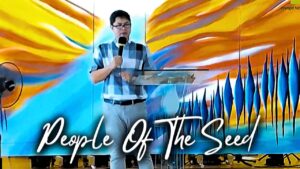Scripture Reading; 1 Samuel 25:6-12; 36-38
“And thus shall ye say to him that liveth in prosperity, Peace be both to thee, and peace be to thine house, and peace be unto all that thou hast. And now I have heard that thou hast shearers: now thy shepherds which were with us, we hurt them not, neither was there ought missing unto them, all the while they were in Carmel. Ask thy young men, and they will shew thee. Wherefore let the young men find favour in thine eyes: for we come in a good day: give, I pray thee, whatsoever cometh to thine hand unto thy servants, and to thy son David. And when David’s young men came, they spake to Nabal according to all those words in the name of David, and ceased. And Nabal answered David’s servants, and said, Who is David? and who is the son of Jesse? there be many servants now a days that break away every man from his master. Shall I then take my bread, and my water, and my flesh that I have killed for my shearers, and give it unto men, whom I know not whence they be? So David’s young men turned their way, and went again, and came and told him all those sayings.
And Abigail came to Nabal; and, behold, he held a feast in his house, like the feast of a king; and Nabal’s heart was merry within him, for he was very drunken: wherefore she told him nothing, less or more, until the morning light. But it came to pass in the morning, when the wine was gone out of Nabal, and his wife had told him these things, that his heart died within him, and he became as a stone. And it came to pass about ten days after, that the LORD smote Nabal, that he died.
I have no time to read the whole event in this story but I just read the portion of scriptures that is relevant to this message. For the other scriptures we will just refer to it when necessary.
I want to quote again from 1 Samuel 25:6 and 1 Samuel 25:8
“And thus, shall ye say to him that liveth in prosperity, Peace be both to thee, and peace be to thine house, and peace be unto all that thou hast.’
‘Wherefore let the young men find favor in thine eyes: for we come in a good day: give.’
Before I go into message, I want to clarify that this message is not meant for anybody in specific but to all of us in general. It is a message that I received from God during one of my recent devotion. Last week I also shared on 1 Samuel. In my devotion, I have finished 1 Samuel and 2 Samuel and I am now into 1 Kings. So, this sermon, comes as a result of my daily devotion. Actually, I received this message on the 31 December 2018. I was struck by the phrase, ‘him that liveth in prosperity’; thus, my title, ‘In times of prosperity’. And I find that it is very appropriate for us. I mean we are believing for a year of release and I feel that this is something we must obey if we want to have the year of release. You are starting to have your own house after marriage, a stable job and kids in the family. Sis Kabayao noticed that one of the characteristics of our church is we have so many couples that serve God together in the ministry. So, it means you are also prosperous in your family life and even social life. You are living in an environment where verse 8 says, ‘in a good day.’ And now YHWH comes to you in the good day and has some words for you. These are all what I call in times of prosperity. Also, this message is for me personally and for all. Quite a number of you are experiencing a much better living than before. You may not be super rich like Nabal but you cannot deny that you are experiencing success and riches. Then this message is for you. What can we learn from this portion of scriptures?
1. The Meaning of Nabal
The scripture concerning Nabal is clear. I Samuel 25:6 says Nabal lived in times of prosperity. We learned that he was very wealthy in livestock. He had 1000 goats and 3000 sheep. During the olden days, your wealth is measured by the size of your livestock. There is a word play on his name. Nabal means ‘churlish’. A churlish man is one that is difficult to work with and deal with. It implied that he was a harsh man and was evil in his dealings. He has a wife called Abigail. Abigail, on the other hand means good, understanding and beautiful in appearance. The bible tells us that he is a Calebite. It probably means that he is a descendant of Caleb. It seems that not all of Caleb’s offspring turned out well, as we can see from this man Nabal. Again, there is a word play on the name Calebite. Calebite also means ‘dog’. During those time dogs were not pets but unclean street scavengers. Calebite is an adjective which means that Nabal was ‘dog-like’. Probably it renders that Nabal was ‘snappish as a dog’. I have two rottweilers. They have interesting behavior. The male is called Agus and the female is called Betha. When it comes to food especially bones; Betha will be far away from Agus because he will snap at her and even bit her. All the bones belong to Agus. On the other hand, when it comes to matting season, Agus has to be careful because Betha will snap at Agus when she doesn’t like it. The manuscript possibly read Caleb as dog-like in his heart. Even Abigail admitted that her husband was true to his name; she means he is a fool. This is found in verse 25 which reads, ‘even Nabal: for as his name is, so is he; Nabal is his name, and folly is with him.’ He is a fool and so foolishness follows him. So, we can safely say that Nabal was a bad man. And he is considered unclean in his behavior. Sometimes we don’t understand why such a man like Nabal can have such a wife as Abigail. Dr. McConkey called the story of Nabal and Abigail ‘Beauty and the Beast.’ Maybe Abigail’s parents were impressed with this man’s wealth, and it was a case of beauty being sold for gold – traffic in a human soul. Perhaps you are saying, ‘That’s terrible’. It is terrible, but it happens all the time in our contemporary culture. How often it happens we do not know. It is an awful thing. There are many marriages that is similar today. Your husband is churlish, arrogant, snappy like a dog. But you are the one that is wise, discerning with spiritual insight like Abigail (in the way she handles the anger of David) and soft towards God. Many a times you save your Nabal husband and the household by your emergency action. Actually, some bible commenters said the strange story of Abigail and Nabal was included not only to explain the marriage of Abigail and David, but also to demonstrate God’s intervention in behalf of a faithful wife who had a vexing husband. Pastor Lily said that David was very rich because he married Abigail. So, we can say that she is quite a lady. I want to say that if you remain Nabal, you may lose everything, including your wife.
Nabal did not change even though he had such a wonderful wife. And in the end, he lost his own life. Don’t name your children ‘Nabal’. Look at your own life right now for a moment. Are you doing something that makes you a fool?
2. The Declaration of YHWH
In spite of who he is and what is he like David came to him in peace. It was also the annual sheep shearing festivals. The bible descriptions of manners and customs are almost identical with what exist today. On such a festive occasion, near a town or city, there is great celebration and we learned that he celebrated as a king. I think Jaro Fiesta is one of the biggest in Iloilo City. We see celebration everywhere as is the customs and manners. During this type of festivities people are usually more generous and more giving. But Nabal is not. Nabal celebrated like a king. Is God angry that he celebrated like a King? No. But not just for personal consumption. A bible commentator shares this experience: ‘Often when I have been trying to get money to buy food or clothing for the very poor, I have been surprised by the caring spirit and the generous gifts of those who did not have much more than those who are receiving the food and clothing. And I have also at times been shocked by those who could have rendered great help but gave nothing. Nabal’s kind have continued to proliferate in our society.’ Etab must not be like that. We want to be known in Iloilo City as a church that is generous and caring for the poor.
When David sent his men to Nabal, they came with an important greeting! Nabal is to:
‘have a long life’
‘peace be to you’
‘peace be to your house’
‘peace be to all within your house’
This is a very important declaration. In the REB version, ‘have a long life’ is translated as ‘all the good wishes for the year ahead.’ Chinese New Year was just celebrated. I sent greetings to friends and the content of my message is ‘all the good wishes for the year ahead.’ So long life is understood as a wish in the sense of ‘good fortune to you’. So, David comes to him and say, ‘may all the good wishes for the year ahead be upon you’ and ‘may all the good fortunes be to you.’ ’Isn’t this what all humankind wanted? Yet all humankind failed to see that this is also what YHWH wanted for us. This is what YHWH wanted for Nabal. In spite of what Nabal is, YHWH represented by David comes to him with a declaration of peace; he is to have all the good wishes for the year ahead. When a person is in prosperity. He longs for long life, He longs for peace within. He longs for peace in the house and he longs for peace for all within the house. Peace is repeated three times. What is peace? It still denotes the absence of evil and the presence of good; that is, contentment of life. It denotes a mental state of security and satisfaction. I have always believed that YHWH has never been against prosperity. But you don’t have to be wealthy and ungodly. Job was even richer than Nabal. Job had 7000 sheep but he was godly. Actually, the description of Nabal’s wealth makes him sound like Job before disaster struck. The problem with Nabal was not his prosperity. The problem with Nabal is he as a person. Actually, you can say that YHWH represented by David, comes to Nabal and greeted him with peace three times. And this morning YHWH comes to you and declares to you ‘Peace, peace, peace.’
3. Expectation of YHWH in Blessing you with Prosperity
Of course, YHWH has certain conditions which I felt were not unreasonable but actually good for his soul. YHWH’s condition is actually for the salvation of his soul. Of course, YHWH’s condition is also for the salvation/deliverance of others.
But then, how must you respond to God. What must you do to men of God like David? David expected a generous food provision for the protection of Nabal’s flocks. David gave the reasons why Nabal should help him with the provision for his men. I mean he protected Nabal’s shepherds and flocks and he has not taken any of Nabal’s animals for food. It is said that during that era, there is the danger of Nomadic raid which can come suddenly and steals all the livestock and kills your workers. And David’s 600 men protected Nabal’s flocks. It is meant to remind us all who lives in times of prosperity that YHWH has protected us and our earnings. YHWH has not taken away any of our earnings. We have not lost any of our earnings.
Also, David was living this part of Israel that is known as the Wilderness of Paran. Wilderness of Paran means the wilderness of life. It also means a wondering life. David and his 600 men have problem obtaining provision and placing food on the table every day. In the Wilderness of Paran; in Exodus, YHWH sustained and delivers these people with manna from heaven, quail meat that dropped from the sky and water from the rock. These are unnatural and miraculous supplies. Probably David is fleeing from enemies. There are many people that are experiencing the wilderness of life and are running from creditors and hiding in life because of trials of life. In the Philippines we have to face the fact that there are many having problem providing for the immediate family and placing sustenance on the table every day.
You have to respond in the correct manner to take away the selfishness in you and the hardness of the heart. Nabal celebrated the festival like that of a king. But he is not willing to help those in the wilderness of life and hiding from the trials of life. How does YHWH sustain and delivers people from the wilderness of life and the wondering life? Through you who lived in times of prosperity. The bible says, he who gives to the poor lends to the LORD. Proverbs 19:17 says, ‘Whoever is kind to the poor lends to the LORD, and He will reward them for what they have done.’ It is a beautiful thought that by showing mercy and pity, we are, as it were making God our debtor. YHWH owes us a debt. I think if Nabal was to do that, YHWH would have owed him a debt and he would not have died. Actually, he would have saved his soul.
4. The Sorrowful End of Nabal
This is how Nabal responded.
1 Samuel 25:9-11 says, “When David’s young men came, they spoke to Nabal according to all these words in David’s name; then they waited. But Nabal answered David’s servants and said, ‘Who is David”. And who is the son of Jesse? There are many servants today who are each breaking away from his master. Shall I then take my bread, and my water, and my flesh that I have killed for my shearers, and give it unto men, whom I know not whence they be?”
The bible says, ‘then they waited.’ It means they were waiting for the fulfillment of their request. Probably they waited for quite a while because if not, this verse would not have said they waited. Nabal was harsh and behaved arrogantly. Somehow, times of prosperity has a tendency to cause us to be harsh and behave arrogantly and make others wait who needed help. In the mind of Nabal is this, ‘Shall I help someone who I knew not?’ In these three terse verses, we learn that wealth does not automatically create generosity. The story also reminds us that there are worse things than saying no to a request, and that is treating those who ask for help with contempt and derision. Since he made the men wait for an answer, the response more likely reflected Nabal’s character and feeling rather than a momentary loss of temper: What he did was deliberate and a thing in which he seem to take delight. He showed his contempt by pretending never to have heard of David, the son of Jesse. He fueled the insult by suggesting that David might be some runaway slave. He insulted their intelligence by suggesting that giving to them would be tantamount to taking food from his own servants’ mouths. Nabal’s problem had moved beyond being stingy or lacking generosity. He had become mean spirited and hurtful in his dealing with people. Later the Scriptures will describe a paralysis which immobilized him but long before that time his heart was frozen and his spirit calloused.
I think we all have heard the story of the two daughters of the Chaebol who owns Korean Air. The Chaebol controls the economy of South Korea. It came out in the news worldwide. Their stories were known as the ‘nut case’ and the ‘water throwing case’. The two daughters were difficult to work with or deal with. One of the daughters, forced two flight attendants to kneel and beg for forgiveness because they served her Macadamia nut in a bag instead of on a plate. She also ejected one of the two attendants off the plane by forcing the plane to turn back to the airport. The other daughter lost her temper because she was unhappy with the answer from an advertising executive in a meeting and threw water at that person. These are the Nabals of our modern society.
To the question of Nabal (do I have to give to those whom I knew not?)’ the answer is YES. And I say to you, ‘you cannot afford not to give.’ You have to give unto those whom you knew not. Actually, to make them wait was meant to show them disrespect. The bible says, Nabal behaved arrogantly. We must not make the impoverished wait. We must not behave arrogantly. They need ‘bread and water’. Bread and water are an idiom for food in general. I believed one of the reason YHWH is blessing Etab is because we have been feeding the community.
The things that made Nabal worse is he taunted the poor. We like to make statement to the poor like, ‘why can’t they just find a job and not be poor?’ ‘They must be lazy; that is why they are poor.’ We must not be like Nabal; he not only taunted them but also insulted them.
“And it came to pass about ten days after, that the Lord smote Nabal, that he died. And when David heard that Nabal was dead, he said, Blessed be the Lord, that hath pleaded the cause of my reproach from the hand of Nabal, and hath kept his servant from evil: for the Lord hath returned the wickedness of Nabal upon his own head. And David sent and communed with Abigail, to take her to him to wife.”
1 Samuel 25:38-39 KJV
The cry of the poor can reach heaven. Pro 21:13 says, ‘Whoever shuts their ears to the cry of the poor will also cry out and not be answered.’
These verses imply that when Abigail told Nabal about David’s plans and presence, he had a stroke and survived for only 10 days. The phrase Nabal ‘becomes like a stone’ in I Samuel 25:37 is a common Aramaic idiom meaning he had a heart attack or stroke and became paralyzed. Some bible commentator says that the LORD put an end to his life after 10 days by a second stroke. This is a common sickness in our modern society. Just a few days ago, the son of the billionaire, Popiah King of Singapore, only 43 years old died of a stroke that leads to brain hemorrhage. while celebrating Chinese New Year in Malaysia with his wife and one-year old child. His death was sudden and fast. He just complained of intense headache on last Saturday and asked his wife to call an ambulance. After being taken to the hospital where doctors worked to save him, he died on Sunday morning. The Popiah King of Singapore with tears in his eyes says, ‘This is a pain in my heart that will never be able to heal.’
Nabal’s stroke could have been caused by
The fear of David. After a drunken night, Nabal found out how narrow an escape he had had from David who came with 400 of his men and it terrified him that he was smitten with a stroke. It could also be anger towards David because of the loss he has sustained as a result of feeding David and his 600 men. It could also be vexation that his wife should have made him humble himself in such a manner; for he is described as a hard, unbending and self-willed man. Of course, it could be anger about what his wife did behind his back. Reading this portion of scripture, I am more inclined that Nabal was angry that his wife gave David food from his storehouse. It made YHWH angry with his reaction and the LORD struck him. And YHWH struck him twice. I mean Nabal could have just died in the first stroke but then he has to have another stroke to permanently die.
I Samuel 25:38 says, ‘the Lord struck Nabal’. This kind of statement often causes problems for modern western people. It implied all causality is attributed to YHWH in the Old Testament. People reap what they sow (the two ways, cf. Leviticus 26; Deuteronomy 28). YHWH is taking action on behalf of His future king, who is His beloved child. But one also must not take this verse as a proof-text for Divine Determinism.
In conclusion, this story reminds us that when we live in time of prosperity and in good day it is for a purpose. Blessing is not to be shared only within the family but freely distributed to those in living in the wilderness of life and a wondering life. We must hear the cry of the wilderness.





